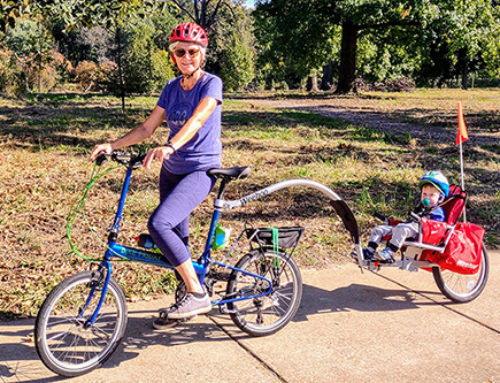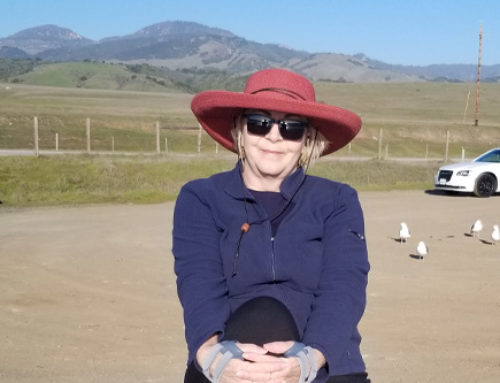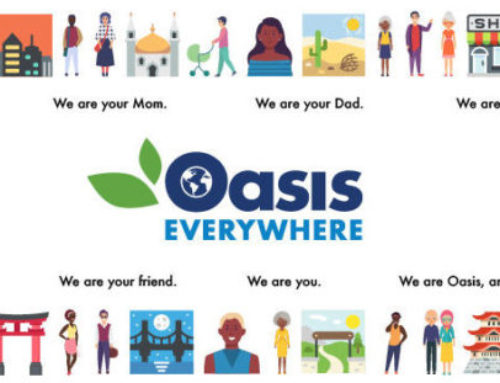 Things are about to heat up for Pam Muhlenkamp, but she’s ready.
Things are about to heat up for Pam Muhlenkamp, but she’s ready.
As an Oasis-CLAIM Medicare counseling volunteer, Pam is prepared for a steady stream of older adults who will come to Barnes-Jewish West County Hospital in St. Louis, during Medicare Open Enrollment, which starts October 15 and lasts through December 7. They’ll be in search of help navigating a process that has a lot of moving parts. Pam is happy to be that friendly face to walk them through their options.
“There are so many things to know and so many decisions to make, especially if you are signing up for the first time,” says Pam. “I worked with a medical physicians group in software for nearly 30 years, and came to know a lot about Medicare. I like to solve problems, so I thought this would be a good fit.”
Pam, who also spends a lot of time with her grandchildren, and sings in a church choir, is looking forward to her fourth year as a Medicare counselor.
“One of the most common concerns people have is figuring out how they can make sure their expensive medicines will be covered,” she says.
Last year, Pam’s tenacity and know-how with the system made all the difference for a local woman whose sister signed up late for Medicare and misunderstood how her marketplace coverage fit into the equation. Thanks to Pam, the woman was finally able to help her sister get the coverage she needed, her penalty fees were waived and some refunds for costs incurred while she wasn’t covered will be recouped, at least in part.
Changes to watch for in 2019
Medicare counselors like Pam are trained regularly to be kept abreast of changes that happen from year to year with Medicare coverage. There are a number of things to know for 2019:
- Donut Hole Closing: An expensive element of the Medicare Part D prescription drug benefit requires enrollees with high prescription costs to pay more for their medicines after they reach a certain level of spending in one year. This creates a coverage gap – also called the “donut hole.” After a beneficiary’s out-of-pocket spending reaches a second threshold, they enter catastrophic coverage and pay substantially less. Under the Affordable Care Act (ACA), the donut hole was scheduled to close in 2020. But the spending bill Congress passed in March will close the donut hole for brand-name drugs in 2019. The gap will close for generic drugs in 2020.
- Therapy Cap Gone: Beneficiaries of original Medicare won’t have to pay the full cost of outpatient physical, speech or occupational therapy because Congress permanently repealed the cap that has historically limited coverage of those services.
- Better Information: Medicare is updating the handbook it sends to beneficiaries every fall. It will include checklists and flowcharts to make it easier to decide on coverage. The online Medicare Plan Finder tool will be easier to use and an improved “coverage wizard” will help enrollees compare out-of-pocket costs and coverage options between original Medicare and Medicare Advantage.
- More Telemedicine: Medicare is steadily broadening the availability of telehealth programs that let patients confer with a doctor or nurse via telephone or the internet. In 2019, it will begin covering telehealth services for people with end-stage renal disease or during treatment for a stroke.
- Lifestyle Support: Beginning in January, Medicare Advantage plans have the option to cover meals delivered to the home, transportation to the doctor’s office and even safety features in the home such as bathroom grab bars and wheelchair ramps. To be covered, a medical provider will have to recommend benefits such as home-safety improvements and prepared meals.
- In-Home Help: Medicare Advantage plans also will have the option to pay for assistance from home health aides, who can help beneficiaries with their daily activities including dressing, eating and personal care. These benefits represent a revised and broader definition of the traditional requirement that Medicare services must be primarily health related.
- Plan Test Drives: New regulations will let people try an Advantage plan for up to three months and, if they aren’t satisfied, they can switch to another Medicare Advantage plan or choose to enroll in original Medicare. Congress required this flexibility in the 21st Century Cures Act, designed to accelerate innovation in health care.
Effective starting in 2019, the Medicare Advantage Disenrollment Period will run from January 1 – March 31 every year. If you’re enrolled in a Medicare Advantage plan, you’ll have a one-time opportunity to do the following:
- Switch to a different Medicare Advantage plan
- Drop your Medicare Advantage plan and return to Original Medicare, Part A and Part B
- Sign up for a stand-alone Medicare Part D Prescription Drug Plan (if you return to Original Medicare). Most Medicare Advantage plans include prescription drug coverage already. Usually you can’t enroll in a stand-alone Medicare Prescription Drug plan if you already have a Medicare Advantage plan, but there are some situations where you can. Call your Medicare Advantage plan if you have questions.
- Drop your stand-alone Medicare Part D Prescription Drug
Oasis Medicare help is available in the St. Louis area
Our offices offer free and confidential help with Medicare questions. This unbiased counseling is provided by knowledgeable, state-certified Oasis volunteer insurance counselors and is a good option for individuals with first-time Medicare enrollment, claims assistance and plan changes.
To get help over the phone, call (800) 390-3330 (Missouri) or (618) 463-7182 (Illinois). To schedule a one-on-one appointment, call (314) 362-7587 (Missouri) or (800) 392-0936 (Illinois).
The State Health Insurance Assistance Programs (SHIPs) provide free, in-depth, one-on-one insurance counseling and assistance in all 50 states.
For more information, visit www.medicare.gov/.






Leave A Comment
You must be logged in to post a comment.